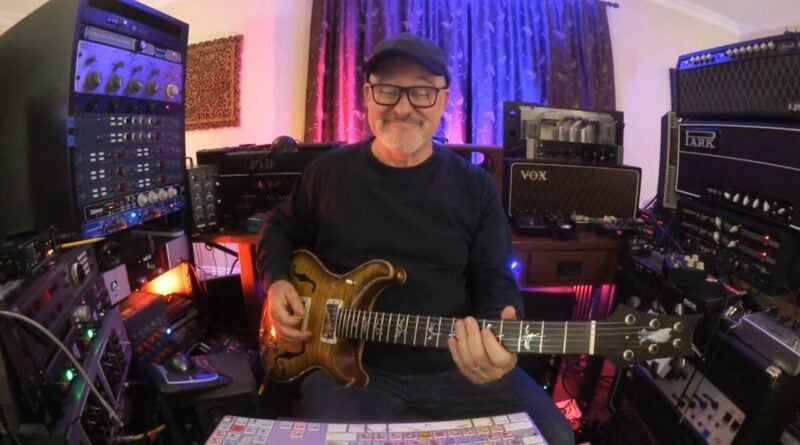During a recent interview with Philip Conrad, guitar session legend Tim Pierce discussed some of the main aspects of his work. Tim, who has worked with plenty of big names in the industry, points out that even session musicians need to put some heart and soul into the music that they’re recording. And, as he explained, this is exactly why he got so many gigs in the past (transcribed by Killer Guitar Rigs):
“But the reason people have hired me is because I play from the heart. And when I play a simple part, it sounds like I really want to be there playing it, and then I own it, and that maybe I wrote it, and that I love doing it.”
According to Pierce, you can have some of the best technical skills in the business but it won’t really matter if you’re not feeling the music and using it all to deliver a good performance:
“You can have a lot of ability on an instrument and be able to play anything, but if you show up and what you’re playing seems beneath you, or too easy for you, that can be a problem.”
“Now, I think in this day and age, more musicians understand this. And when they play a simple part, they play from the heart. For me, I moved to a city where there was music going on, I did as much as I could to do every session at every price point [laughs], whether it’s $30, or $50, I’m talking decades ago.”
“I also tried really, really hard to bend over backwards to deliver what people wanted.”
However, despite this being a very favorable trait for a session musician, Tim also pointed out that it comes with a set of problems. Mainly because you can really put your heart and soul into it, only to have your ideas rejected:
“The problem with being a musician in a collaborative situation is that you will get your feelings hurt. So what I always say is that you have to allow your ego to get obliterated when they reject this amazing thing that you just played from the heart, and then you have to be able to bring it back full force when you try the next thing.”
“So you’ll be playing, you’ll try something, and then they’ll go, ‘Nah, we’re not into that. What else you got?’ Your feelings get hurt, and you get mad, and you have to put that away, come up with the next thing, and then own it.”
Nonetheless, Tim adds that this is just part of the business and that one should know how to properly deal with this sort of rejection:
“So that’s really the rollercoaster that some musicians have trouble with in the studio in the creative process. I was always able to do that — I recognized what it was. [There’s] always a point in a session where you become resentful about something — deep breath, put it away.”
But as he also explained, the very nature of session work will require you to put some feelings into it, no matter the style of music that you’re working on. Tim continued:
“At a certain point, the actual work situation demands it from you. So if you’re scheduled, you’re working from noon to 9 pm, you’re on the fourth song, and you’re going, ‘This is not a song I even like, but I have to come up with something good for it and really deliver my best.'”
And it’s all about staying positive and keeping your focus on the music that you’re recording. It comes with its challenges but, as Tim points out, it’s still something to be passionate about:
“You have no choice. You’re booked, you’re getting paid, you’re scheduled, so you can’t walk away. It’s like not having a back door and not having an exit door.”
“That’s part of the discipline of it — no matter what the situation, making sure that you stay positive and you do your best, because you don’t want to drive home feeling like you could have done better and that you should have been nicer, and you should have tried harder.”
During the interview, Tim also talked about his practice routine and how he tends to record himself while playing at home. The point of this isn’t just to examine his technique but rather to see if he’s not using too many notes:
“I actually film myself practicing to see if I’m too busy. You know, try not to do that run-on sentence when I’m playing, trying to leave space, and trying to show emotion.”
Again, there’s the “heart and soul” aspect that, no matter how great your technique is, you should never ignore:
“The hardest thing as a guitar player is that you can concentrate on technique and leave heart and soul behind. I can look at myself playing and go, ‘Oh, this is by rote. You’re just playing a run-on sentence of stuff with your left hand, where’s the heart and soul? Gonna have to try and reinsert that.’”
Photo: TimPierce.com


